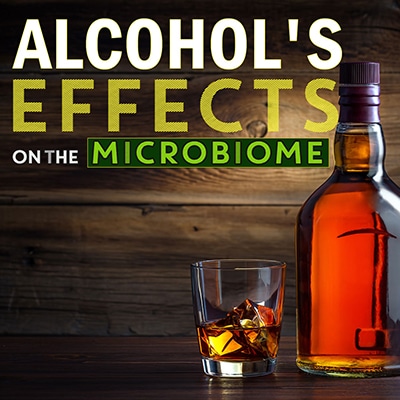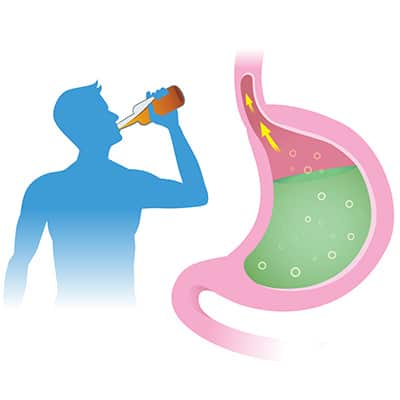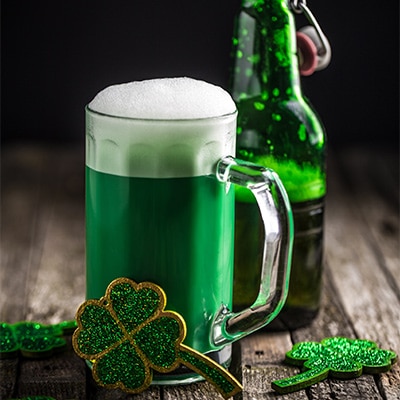Alcohol’s Effects on the Microbiome

So you just had a great night out with your friends. You had some alcohol to relieve your stresses of the week.
You totally let loose and had an awesome time!
Except, now you’re paying for it…
Headache, a little dizzy, nasty stomachache… AAAHHHHH why are my legs cramping?!
This SO did not happen when you were 21.
It has to be… No, it can’t be… Not me! I’m not…. OLD!
It’s okay, it happens to us all. It’s normal, right?
Drinking is fine on occasion.
Drinking isn’t going to kill you. Alcohol isn’t that bad.
Red wine is great for your heart — a bottle of wine keeps your heart fine..?
I’m sorry to say, that isn’t quite true.
Effects Alcohol Can Have on the Body
The vast majority of us have experienced the side effects of a good night out.
Whether the cause was a birthday, the Superbowl — or any other big deal sporting event — or just a really rough work week.
We drank, enjoyed the blissful state of our buzzy brain, and then dealt with the aftermath the next day.
It’s just dehydration and a bottle of Gatorade, some water and ibuprofen will fix it all!
Wrong again, my friend.
While dehydration definitely plays into some of the undesirable side effects of alcohol consumption, it isn’t actually the cause of your despair.
Dehydration is more of a side effect itself.
Some of the other problems alcohol can cause include:
- Organ dysfunction (especially liver)
- Liver diseases
- Immune system dysfunction
- Heart disease
- Pancreatitis
- Cancer
- Obesity
- Types 1 and 2 diabetes
- IBS and IBD
- Celiac disease
- Food allergies
- SIBO
- Alcoholic dementia
This must only be for alcoholics, right?
Again, no.
Anyone who consumes large amounts of alcohol — occasional binge drinking included — is susceptible to all of these problems.
How Alcohol Affects Your Microbiome
Alcoholic beverages contain many different toxins.
All of these toxins have negative effects on your body — especially the bacterial homeostasis in your gut.
What are these toxins and what problems do they cause through the gut?
Alcohol and Leaky Gut

Ethanol is created through the fermentation of carbs and is pretty much another term for alcohol.
Ethanol is broken down by the enzyme alcohol hydrogenase (ADH).
The metabolite created through this process is acetaldehyde.
Acetaldehyde contributes to most of the unpleasant effects alcohol has on your body, like nausea and headaches.
The World Health Organization (WHO) considers acetaldehyde to be a group 2B carcinogen.
This means that there is a possible chance that acetaldehyde can lead to cancer.
Some studies are showing that this should be reevaluated because there may be a direct link between alcohol consumption and cancer.
During animal testing, it was noticed that alcohol administration increased the amount of acetaldehyde in the intestines.
The administration of antibiotics helped to relieve this increase which determined that bacteria enhance the generation of acetaldehyde.
This is not to say that taking antibiotics will curb the dangers of alcohol intake — just that they are a good determinant as to whether bacteria are at fault or not.
Typically your bacteria in your gut will produce aldehyde dehydrogenase (ALDH).
ALDH helps your body to metabolize acetaldehyde and rid it from your body.
However, with excessive alcohol intake, there is more acetaldehyde in your system which increases intestinal permeability (IP).
IP is when the mucosal membrane of your intestinal tract is compromised and allows for bacteria, endotoxins, and other substances to pass through that normally wouldn’t.
Originally it was thought that ethanol itself was the issue that increased IP, however, several recent studies have shown that acetaldehyde — not ethanol — is actually to blame.
Drinking alcohol may lead to leaky gut since alcoholic beverages all contain acetaldehyde.
Alcohol and SIBO
Alcohol affects your intestinal motility — that is, how quickly or slowly your food/drink is digested.
When the contents of what you eat don’t go through your gut at their normal pace, it can lead to bacterial overgrowth in your small intestines.
Small intestinal bacterial overgrowth (SIBO) is defined as having an excessive amount of bacteria growing in your small intestines.
SIBO is known to cause bloating and abdominal discomfort as well as constipation, diarrhea and malnutrition, but it also seems to have a huge role in liver diseases related to alcoholism.
SIBO leads to increased formation and circulation of toxins and endotoxins.
Endotoxins are lipopolysaccharides that are derived from your intestinal bacteria. If there are increased levels of bacteria, more endotoxins can be created and thrown into your circulation.
When there is a mixture of more endotoxins and increased IP, translocation becomes an issue.
When bacteria and endotoxins are translocated they are traveling outside of their normal areas where they are necessary, and instead go places they shouldn’t and become dangerous.
Endotoxins in excess start entering the portal vein. Your portal vein is the road that leads blood and its contents into your liver.
Your liver is supposed to take toxic substances and turn them into useful products for your body to use (i.e. vitamins, minerals, and sugars).
Some toxic substances taken in by the liver, like ammonia, need to be removed from the body and the liver takes care of this as well.
With ammonia, your liver will pass it over to your urinary system for it to be filtered out through urine.
When toxins come in at too fast of a rate, or in too large of quantities, your liver has a hard time processing them which can lead to numerous liver disorders.
How to Limit Damage From Alcohol
Completely eradicating alcohol is not really a thing — just look at how the prohibition of alcohol went in the United States in the early 1900s.
With Saint Patrick’s Day over and done, we hope you celebrated with your green beer!
Speaking of green beer, here are some fun facts about your frothy, festive beverage:
- The first bouts of green beer weren’t colored by dyes like we are used to. It actually was ‘young beer’ that only went through its first fermentation and still had extremely high levels of acetaldehyde.
- Green beer nowadays just gets its color from food dye.
- Just be careful with how much green beer you drink — certain food color dyes have been linked to cancer.
- Green beer is actually more of an American tradition than Irish.
Without further ado, here are a few ways to prepare yourself for your nights (or days) of fun-filled boozing.
Protecting Your Intestinal Barrier
A few different things you can take to help protect your intestinal barrier from becoming permeable include:
Oats
Oats are not only a fantastic prebiotic but have also been found to have protective effects against IP.
Over a 10 day period, alcohol was given in increasing doses up to 8 grams/kg per day to animals.
One group was given oats and the other was given normal chow.
The group who had eaten chow experienced leaky gut, increased intestinal permeability, and liver injury.
The group who ate oats didn’t have any of these changes.
L-Glutamine
L-Glutamine helps to protect the intestinal barrier by having an epidermal growth factor (EGF) effect on the intestinal tract.
EGF helps with creating a stronger intestinal barrier and preventing permeability.
L-Glutamine helps in the reduction of acetaldehyde effects on the intestinal barrier.
Zinc
Zinc is an essential nutrient for immune function. Alcohol significantly decreases your body’s ability to absorb zinc.
Patients of inflammatory bowel disease and Crohn’s disease both have shown lowered levels of zinc due to IP.
Since alcohol decreases the amount of zinc your body has, by taking a zinc supplement you can help decrease your chances of having to deal with IP.
Prevention of Hangovers
Now this, THIS is some important information to have in your toolbelt!
A lot of the foods listed below are full of polyphenols and antioxidants which seem to help scavenge free radicals that alcohol consumption can increase in your body.
Here are a few things to look into to prevent that day after drinking death (and they’re all natural *squeal!*)
- Seeds of Fenugreek
- Mango
- Korean Pear
- Persimmon
- Thyme
- Ginger
- Asparagus
- Water dropwort
- Pear cactus (Prickly pear)
- Asian Ginseng
There is some research going on in China on how to reduce levels of acetaldehyde in their alcoholic beverages.
They’ve made one mutant strain of beer that was 81.67% lower in acetaldehyde than normal beer.
If breweries start pursuing this type of beer manufacturing it could be a complete game changer on alcohol. Creating a safer product and potentially preventing cases of liver diseases.
You’re not going to stop drinking just because of an article you read on the internet, but you may take some good information away and stash it away for later use!
The good news is that even if you do indulge, supplements such as Atrantil, which is rich in polyphenols and antioxidants, nourish the microbiome and get rid of bacterial overgrowth to get your gut back on track!
Do you have a great hangover prevention method?
Or maybe an awesome post-drinking routine to avoid a hangover?
Share it in the comments below with us!
To recap Alcohol’s Effects on the Microbiome watch our video below:


I was really hoping that Atrantil would help with the painful bloating after drinking alcohol. Unfortunately, it doesn’t like it can win this fight. I’m on day 2 of a extremely bloated and distracted belly. It is depressing that I can’t enjoy some drinks without such consequence. :(
I cut out alcohol during my sibo elimination diet 8 months ago and haven’t had more than a sip of alcohol since. I really don’t miss it, honestly. For me, drinking enough to get drunk makes me feel so ill (extreme cramping – feeling like my intestines are being ripped apart) that I don’t mind being sober. Unfortunate but it’s better this way. When I read articles like this it just makes me feel better about my choice to protect my intestines from alcohol.
Hi Emily,
Thank you for your interest in Atrantil. A lot of the battle is just developing a healthy and active lifestyle and maintaining it. It sounds like you are already on the path to success! We wish you the best of luck in your Atrantil journey.